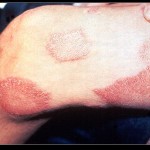Leprosy cases in U.S. traced to nine-banded armadillo
Leprosy cases that have suddenly sprang in the United States are now believed to have come from the lowly nine-banded armadillo.
Researchers have earlier suspected that the leprosy bacteria came from the animals but recent DNA tests confirmed their theory. It is uncommon for people to contract the sometimes disfiguring but curable disease from armadillos unless there is frequent handling of the animals. Eating armadillo meat has also been blamed in at least one case.
The government study was published Thursday in the New England Journal of Medicine. Researchers studied skin biopsies of 50 leprosy patients and compared samples to DNA samples taken from wild nine-bandedarmadillos in five southern states.
Scientists discovered a genetically-unique leprosy strain common in 25 patients and 28 armadillos. Even though the study did not prove direct transmission from the mammals to humans, scientists deduce that it is indeed possible.
Leprosy cases are rare in the United States but remains active in tropical countries with 250,000 new cases reported every year. Early signs include a lumpy skin lesion and can progress to nerve, skin and eye damage in humans. Armadillos meanwhile suffer from liver damage.
Those afflicted with the disease are unfairly stigmatized because of the infectious nature of leprosy and gross deformities that some patients develop. But the condition can't be spread through casual contact or sexual intercourse, only through constant contact with an untreated individual.
Researchers advise people to stay away from armadillos to prevent transmission. People who notice symptoms of leprosy are urged to seek immediate treatment with antibiotics before complications set in.
